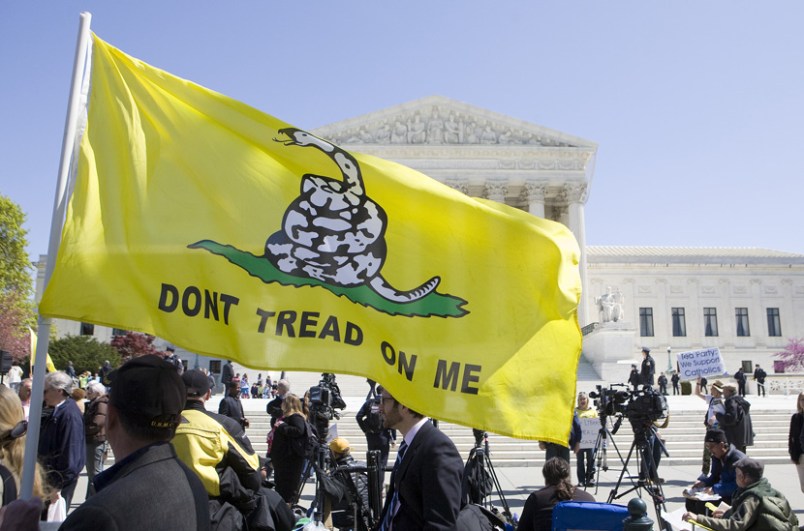Wednesday’s Supreme Court arguments over the fate of the president’s health care law were defined by the same themes that marked the first two days: Liberal justices directed their toughest questions on the challengers, while conservative justices relished the opportunity to tie the administration’s lawyers in logical knots.
That may seem unsurprising — why wouldn’t the same ideological divisions that have dogged the law for two years carry over into the high court, all the way through six hours of oral arguments?
But Wednesday’s arguments weren’t about the controversy at the center of the legal challenge — can the government compel people to buy health insurance? They were about the court’s discretion to interfere with the rest of the law, and a decades-long understanding of the relationship between the federal government and the states. Most legal observers assumed the issues at stake on Wednesday were no-brainers. So the fact that the conservative justices once again aligned — at least rhetorically — in sympathy with the challengers suggests just how tempted they are to swing for the ideological fences.
Many legal experts we spoke with in advance of the arguments were surprised that the court agreed to hear the challenge to the health care law’s Medicaid expansion in the first place. Every lower court rejected it. If the Medicaid expansion falls, the implications for federal power — and programs from Medicaid to transportation to civil rights — would be jeopardized.
And yet, for nearly an hour Wednesday afternoon, conservative justices — led by Antonin Scalia, the law’s greatest antagonist on the bench — betrayed no discomfort with such radical implications.
The law’s challengers claim that the health care law’s Medicaid expansion is coercive because states that refuse to adhere to it will lose all of their Medicaid funding. Their reluctance persists even though the federal government will cover nearly the entire cost. The program is so entrenched, that at this point states are captive to it, and can’t turn down any new federal restrictions on the program, let alone significant ones such as a major eligibility expansion.
The conservative justices pressed Solicitor General Donald Verrilli Jr. — relentlessly — to accept the premise that the states can be commandeered by Medicaid and similar programs. Verrilli stumbled.
“I don’t think that this is a case that presents that question,” he argued.
“No, no, I know,” said Chief Justice John Roberts. “I know this. I don’t know if I will grant it to you or not. But let’s assume it’s not this case.”
“I wouldn’t think that is a surprise question, you know?” said Scalia.
The notion that the court could balk at the health care law’s Medicaid expansion terrifies both reform advocates and supporters of myriad federal programs. If the court determines that the new conditions imposed by the health care law are coercive to the states and therefore violate the 10th Amendment, it will at the very least call into question future congressional attempts to modify or enhance other programs the states run with the help of federal funds.
But the conservative justices were more blasé about the day’s other key issue: If the individual mandate falls, how much of the rest of the law should the court uphold? The one appellate court that ruled the mandate unconstitutional also held that the entire rest of the law should be allowed to stand. At least two of the Supreme Court’s conservatives appeared inclined to scrap the whole law.
Justice Anthony Kennedy argued that this would be an exercise of judicial restraint.
“We would be exercising the judicial power if one act was — one provision was stricken and the others remained to impose a risk on insurance companies that Congress had never intended,” he said. “By reason of this court, we would have a new regime that Congress did not provide for, did not consider. That, it seems to me, can be argued at least to be a more extreme exercise of judicial power than to strike — than striking the whole.”
Scalia was more blunt.
“My approach would say if you take the heart out of the statute, the statute’s gone.”
The justices’ oral arguments are not necessarily determinative of their votes. But they do suggest some sympathies with positions many legal scholars believed were beyond the pale, even in today’s court.










